Every Studio Ghibli movie ranked from worst to best

Studio Ghibli is perhaps the greatest animation house ever created. Founded in Tokyo, Japan in 1985 by directors Hayao Miyazaki and Isao Takahata and producer Toshio Suzuki, the studio named after the Italian word for the high-speed Mediterranean gale aimed to "blow a new wind through the anime industry". Considering that many of its movies have received numerous accolades and are some of the highest grossing films in Japan, it would appear that that goal has been achieved numerous times over. What makes Studio Ghibli unique, not only in anime or even animated features in general, is its warm, honest, and imaginative look at the human condition. Studio Ghibli's films always treat their audience as intelligent, never talking down to younger viewers or making its themes and stories over-wrought. And like someone who has to pick between his favorite children, I'm going to rank all 21 of the studio's feature films - because even at their 'worst' these movies are second-to-none.
- 25 best Disney songs to make your heart go bippidy-boppidy-boop
- 50 greatest Disney movie moments
- 30 best Pixar Easter eggs you might have missed
21. Tales from Earthsea, 2006
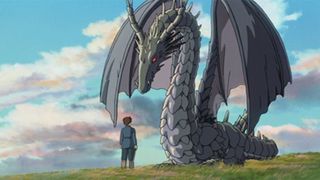
Director: Goro Miyazaki
Hayao Miyazaki's son Goro Miyazaki makes his directorial debut with this film, and unfortunately, it's probably the only movie on this list that could be considered 'mediocre'. Very loosely based on Ursula K. LeGuin's fantasy novels of the same name, Tales from Earthsea takes place in a strange desert world unbalanced by chaotic magical forces. It's not a bad movie, exactly, but it often resembles a direct-to-DVD imitation than a true Studio Ghibli film. It also feels very detached, lacking the warmth and humanity found in virtually every other film by the studio. A serviceable fantasy flick, but by Ghibli standards, it's a bust.
20. My Neighbors the Yamadas, 1999
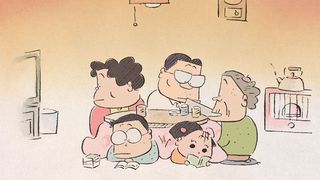
Director: Isao Takahata
Co-founder Hayao Miyazaki and his fantasy epics may be the most famous parts of Studio Ghibli, but fellow director Isao Takahata is perhaps the more interesting. His films experiment with a wider variety of animation styles and storytelling devices than his co-animators, and My Neighbors the Yamadas is perhaps the most 'un-Ghibli' film the studio's ever made. Utilizing a unique comic-strip art style, My Neighbors the Yamadas tells a series of vignettes about the titular family, each one focusing on the humor that arises from basic marital conflicts. It's a simple film, and perhaps a bit slight, but it's as heartfelt and honest as any of the studio's more popular titles.
19. Pom Poko, 1994
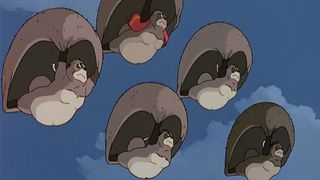
Director: Isao Takahata
Another film by director Isao Takahata, Pom Poko is strange. It’s a darkly comic folktale which follows a family of magical raccoons who are able to transform into anything, from a salaryman working in an office in downtown Tokyo to an inanimate rice cooker. Ever since the Japanese housing boom in the 1960s humans have continued to encroach on the raccoons' homes, so the raccoons do what they do best - scare the bejeezus out of them. Pom Poko's strangeness is omnipresent, with a story that takes some twisted, Roald Dahl-ian turns and a visual style which regularly shifts between photorealistic animation and more abstract, comic-style depictions. Hell, all of the male raccoons' testicles are clearly visible - and there's even a scene where they stretch them out to soar through the air like a flying squirrel. The fact that this film ever made it out of Japan - released in North America by Walt Disney Pictures, no less - pleases me greatly.
18. From Up on Poppy Hill, 2011
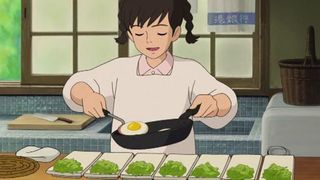
Director: Goro Miyazaki
Goro Miyazaki's second animated feature fares much better than his first, in part because it opts to tell a smaller, more intimate and human story than Tales from Earthsea, and also in part due to a script written by his father. Set in 1960s Japan, From Up on Poppy Hill follows high-schooler Umi Matsuzaki, who befriends Shun Kazama, a writer for the school paper. The two grow closer as they attempt to fix up an old building that's scheduled for demolition, but their budding romance hits a roadblock as they discover some surprising information about their own past. Its story isn't exactly revolutionary, but it's pleasant tale set in a bygone era.
17. The Cat Returns, 2002
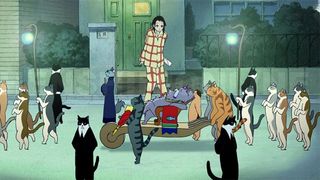
Director: Hiroyuki Morita
The Cat Returns is a light, bubbly tale about a young, indecisive girl named Haru who saves a cat from being run over. The cat, as these things tends to go, turns out to not only be magic, but the prince of Cat Kingdom, and Haru finds herself betrothed. In order to get out of the marriage, she finds herself embarking on a journey through a strange, fascinating feline world. It's a brisk tale (and a spin-off of another Ghibli film, Whisper of the Heart), but it's one full of imagination and a wonderful sense of adventure.
16. When Marnie Was There, 2014
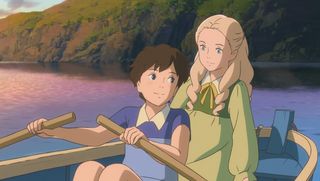
Director: Hiromasa Yonebayashi
It's poetic that Studio Ghibli's final self-produced film after announcing its hiatus isn't some grand fantasy saga, but a small, restrained story about a young girl striving to find her identity. Anna Sasaki lives with her foster parents in Sapporo, her relationship with them as conflicted as her own view of herself. She takes a trip to the country over the summer to live with her foster mother's family, and there, she meets a mysterious girl named Marnie. When Marnie Was There is somber, reflective, and sincere, and if this is where Studio Ghibli's own story as a storytelling force has to end, it at least ends in a good place.
Sign up to the SFX Newsletter
Get sneak previews, exclusive competitions and details of special events each month!
15. Only Yesterday, 1991
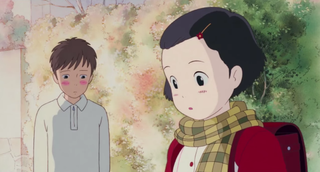
Director: Isao Takahata
Many of Studio Ghibli's films are meant for audiences of all ages, but Only Yesterday is the rare movie meant specifically to appeal to adults. It tells a different kind of story for the studio, following a 27-year-old woman named Takeo, who takes a trip to the Japanese countryside to visit some relatives and get away from the stress of city life. During her travels, she begins to have vivid recollections from her childhood, and wonders if the life she's currently chosen for herself matches up with what she wanted as a child. Isao Takahata's musing on the tribulations of adulthood is simultaneously nostalgic and forward-looking, its messages as relevant now as they were 25 years ago when the film first premiered.
14. The Secret World of Arrietty, 2010
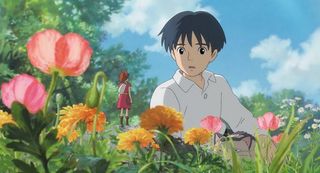
Director: Hiromasa Yonebayashi
Longtime Studio Ghibli animator Hiromasa Yonebayashi made his directorial debut with his adaptation of the classic children's novel The Borrowers, and watching it is like curling up in the sunshine with an old, familiar book. Watching Arrietty flit among the world of the humans, dealing with the everyday objects we take for granted as if they were mountains, is brought to life especially well with Studio Ghibli's signature attention to detail.
13. Howl's Moving Castle, 2004
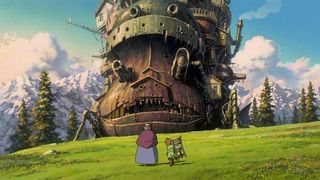
Director: Hayao Miyazaki
Howl's Moving Castle seems like a recipe for unpopularity. It was released shortly after the US invaded Iraq, and its titular anti-hero fights a losing battle he cannot hope to win with little gain for doing so. It's also a critique on modernity as well as youth, as its protagonist Sofie finds herself liberated from society's pressures after a curse transforms her into a septuagenarian spinster. And yet, it's for these reasons that Howl's Moving Castle is a success - a highly inventive story full character and charm that isn't afraid to pull any punches.
12. Ponyo, 2008
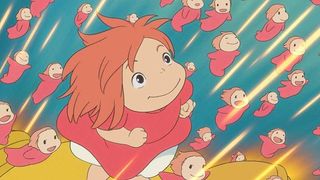
Director: Hayao Miyazaki
If there's one word to properly describe Ponyo, it's 'adorable'. Inspired by Hans-Christian Andersen's The Little Mermaid, Ponyo tells the story of a young goldfish who transforms into a human, befriends a young boy, and discovers a powerful obsession with ham. It's a very simple story on the surface, and the movie just kind of ends after an hour-and-a-half, but it's a boundlessly joyful and visually sumptuous film to behold. Like many of Studio Ghibli's films, once you start to unpack its themes, you'll discover a melancholy current running under its buoyant waves. Also, I dare not to start singing its end credits theme at random intervals in your day once you hear it.
11. Kiki's Delivery Service, 1989
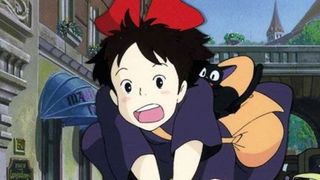
Director: Hayao Miyazaki
One major theme that keeps popping up in Studio Ghibli's works is the transition to adulthood, and Kiki's Delivery Service is perhaps its most obvious and focused reflection on that transformation. Kiki is a young witch who, at the age of thirteen, strikes out on her own to find a job in the city. There, she finds friends and discovers a passion for flying on her broomstick, which she uses to deliver items for the locals. It's the heartfelt story of a girl struggling to find her voice and her independence amid new scenery and a flood of self-doubt, and Phil Hartman's turn in the English dub as Kiki's pet cat Jiji is as humorous as it is tragic, as it was his last voice-acting role before his untimely death in 1998.
Most Popular




